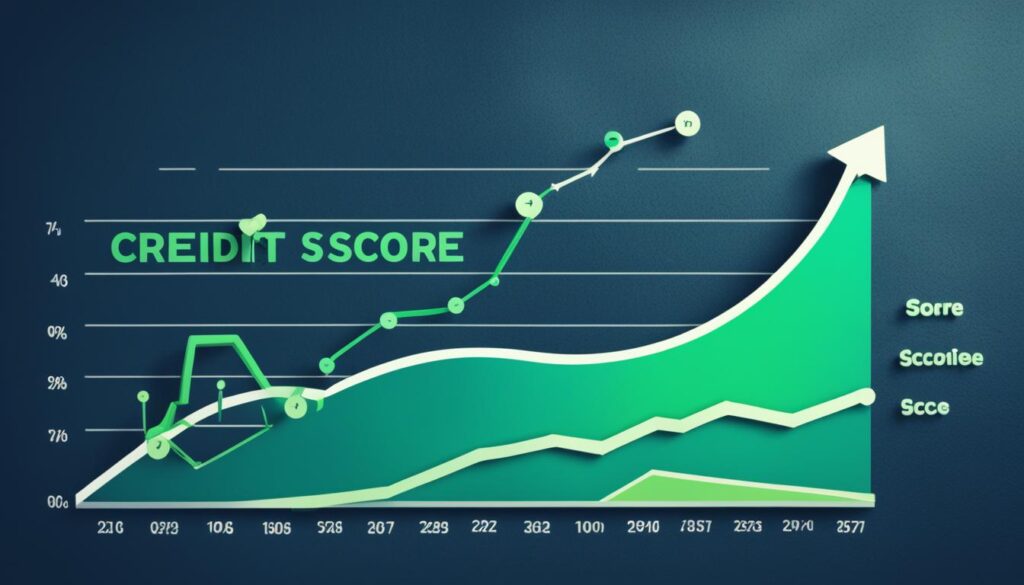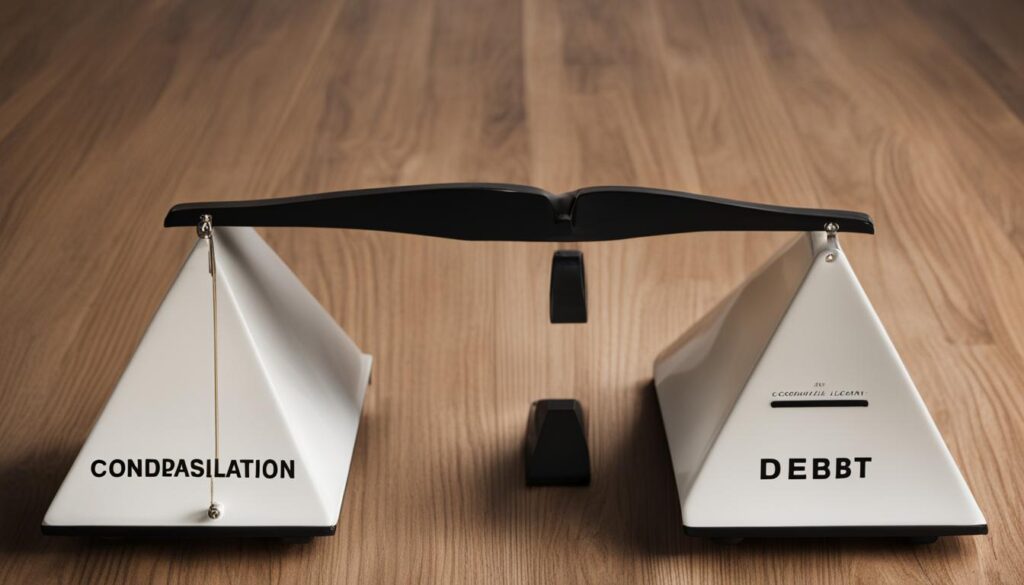Dealing with multiple debts can be overwhelming and challenging to manage. That’s where consolidation loans come in. These loans provide a smart solution for unifying your debt, making it easier to handle and potentially saving you money on interest charges.
There are several options available for consolidating your debt, such as balance transfer credit cards, debt consolidation loans, and tapping into your home equity. Each option has its own benefits and considerations, so it’s important to understand which one is the right choice for your specific financial situation.
Consolidation loans, in particular, offer a structured approach to merging your debts into one manageable payment plan. By securing a consolidation loan, you can simplify your finances and focus on a single loan with potentially lower interest rates.
Key Takeaways:
- Consolidation loans help you combine multiple debts into one, making them easier to manage.
- There are various options for consolidating debt, including balance transfer credit cards, debt consolidation loans, and home equity loans.
- Debt consolidation can have both positive and negative impacts on your credit score.
- It’s important to assess your personal financial situation and goals before deciding if debt consolidation is the right choice for you.
- Debt consolidation is not the only option; alternatives such as debt settlement and debt management plans may also be suitable.
6 Ways to Consolidate Debt
Consolidating your debt can be a smart move towards achieving financial stability and reducing the burden of multiple debts. There are several options available for debt consolidation, each offering unique benefits and considerations. Understanding how these options work can help you make an informed decision based on your specific financial situation.
1. Balance Transfer Credit Cards
Balance transfer credit cards allow you to transfer your existing credit card balances onto a new card with a potentially lower interest rate or a promotional 0% APR period. This can help you consolidate your credit card debt into a single payment, simplifying your financial responsibilities. However, keep in mind any balance transfer fees and the importance of paying off the balance before the promotional period ends.
2. Debt Consolidation Loans
A debt consolidation loan involves taking out a new loan to pay off multiple debts, such as credit card balances or personal loans. By consolidating all your debts into a single loan, you can streamline your repayment process and potentially secure a lower interest rate. Consider factors such as the loan term, interest rates, and any additional fees when choosing a debt consolidation loan.
3. Home Equity Loans
If you own a home, tapping into your home equity can be an option for debt consolidation. With a home equity loan, you can borrow against the equity you have built in your property. These loans typically offer lower interest rates compared to unsecured loans or credit cards. Be aware that using your home as collateral means risking foreclosure if you fail to make the loan payments.
4. Debt Management Programs
Debt management programs are another alternative to consolidate your debt. These programs, offered by credit counseling agencies, involve creating a structured repayment plan with reduced interest rates and monthly payments. Through negotiation with your creditors, you can consolidate your debts into a simplified monthly payment. However, it’s important to research and choose a reputable credit counseling agency.
5. Personal Loans
Using a personal loan to consolidate debt can be an effective option if you have good credit. Personal loans are unsecured loans that can provide funds for consolidating your debts into one payment with a fixed interest rate and term. Compare different loan offers to ensure you’re getting the best interest rate and understand the impact of the loan on your overall financial situation.
6. Retirement Account Loans
If you have funds in a retirement account, such as a 401(k) or an IRA, you may have the option to borrow against it to consolidate your debt. While this can offer lower interest rates and flexible repayment terms, it’s important to consider the potential impact on your retirement savings if you are unable to repay the loan.
Exploring these consolidation options can help you find the best fit for your individual financial circumstances. Remember to consider factors such as interest rates, fees, repayment terms, and any potential risks associated with each option. Consolidating your debt can provide you with the opportunity for a fresh financial start, enabling you to pay off your debts more efficiently and regain control of your finances.
How Debt Consolidation Affects Your Credit

Debt consolidation can have a significant impact on your credit score and overall creditworthiness. It’s important to understand the potential effects before deciding to consolidate your debts.
The Positive Effects of Debt Consolidation
One of the positive effects of debt consolidation is the potential to improve your credit score over time. By consolidating multiple debts into a single loan or repayment plan, you can simplify your finances and make it easier to manage your payments. This can help you avoid missing due dates and making late payments, which can negatively impact your credit score.
Additionally, debt consolidation can reduce your overall debt burden, which can lead to a lower credit utilization ratio. Credit utilization is the amount of credit you are using compared to your total available credit. Lower credit utilization is generally viewed positively by lenders and can contribute to an improved credit score.
The Negative Effects of Debt Consolidation
While debt consolidation can have positive effects on your credit, it’s important to be aware of the potential negative effects as well. Missing payments or defaulting on your debt consolidation loan can have a significant, negative impact on your credit score. It’s crucial to make all payments on time and in full to maintain a positive credit history.
Additionally, taking out a new loan or line of credit for debt consolidation may result in a temporary decrease in your credit score. This is due to the credit inquiry and the potential new debt, which can initially lower your credit score. However, as you make timely payments and reduce your overall debt, your credit score can begin to recover and may even improve over time.
Understanding Credit History and Credit Reports
Your credit history and credit report play a crucial role in determining your creditworthiness. When you consolidate your debts, it’s important to monitor your credit report to ensure that all your accounts are accurately reflected and that any paid-off debts are properly updated. Errors on your credit report can negatively impact your credit score, so it’s important to address any discrepancies as soon as possible.
| Credit Factor | How Debt Consolidation Can Affect It |
|---|---|
| Credit Score | Potentially improves over time if you make timely payments and reduce your overall debt |
| Credit History | Can be positively impacted by simplifying your payment plan and avoiding missed payments |
| Credit Utilization | May decrease as you consolidate debt, potentially improving your credit score |
| Credit Report | Monitor for accuracy and address any errors or discrepancies promptly |
By understanding how debt consolidation can affect your credit, you can make an informed decision about whether it’s the right choice for you. It’s important to weigh the potential benefits against the possible risks and consider your unique financial situation before proceeding with debt consolidation.
Is Debt Consolidation the Right Choice for Me?

Dealing with multiple debts can be overwhelming, but debt consolidation offers a potential solution to simplify your finances and regain control. By merging your debts into a single repayment plan, debt consolidation can streamline your monthly payments and potentially save you money on interest rates. However, before making a decision, it’s crucial to assess your personal financial situation and consider various factors such as your repayment plan and interest rates.
When evaluating debt consolidation as an option, take a close look at your current debts and their terms. Assess the interest rates you are paying and the repayment terms you are facing. Debt consolidation can be particularly advantageous if you have high-interest credit card debt or loans with unfavorable terms.
Debt consolidation can simplify your finances and potentially save you money on interest. However, it’s important to consider your personal financial situation and goals before deciding if debt consolidation is the right choice for you.
A crucial aspect to consider is your personal financial situation. Assess your income, expenses, and overall financial stability. Evaluate whether you will be able to make the consolidated monthly payments comfortably. Debt consolidation is most effective when it helps you create a realistic and manageable repayment plan.
Interest rates are another critical factor to consider. Look for debt consolidation options that offer lower interest rates compared to your existing debts. By securing a lower interest rate, you can potentially reduce the overall amount of interest you pay, saving money in the long run.
If you decide to proceed with debt consolidation, it’s essential to explore different options available to you. Research reputable lenders who specialize in debt consolidation loans and compare the terms, interest rates, and fees they offer. Take into account the reputation and customer reviews of the lenders you consider.
Ultimately, the decision to pursue debt consolidation depends on your unique circumstances and financial goals. It’s important to carefully evaluate whether debt consolidation aligns with your needs before moving forward. Analyzing your personal financial situation, repayment plan, and interest rates will enable you to make an informed decision and take control of your debts.
The Benefits of Debt Consolidation
Debt consolidation offers several benefits:
- Streamlined repayment: With debt consolidation, you can say goodbye to managing multiple payments each month. Instead, you’ll have a single monthly payment to make, simplifying your finances and reducing the chances of missing or overlooking payments.
- Potential interest savings: By consolidating your debts, you may secure a lower interest rate compared to the rates on your existing debts. This can result in significant savings over time, especially if you have high-interest credit card debt.
- Improved financial organization: Consolidating your debts allows you to regain control over your financial situation. You’ll have a clearer view of your remaining balance, payment dates, and interest charges, making it easier to budget and plan for the future.
Alternatives to Debt Consolidation

While debt consolidation is a popular method for managing debt, it may not be the right solution for everyone. Luckily, there are alternatives that can help individuals in different financial situations. Two common alternatives to debt consolidation are debt settlement and a debt management plan.
Debt Settlement
Debt settlement involves negotiating with your creditors to pay off your debts for less than the full amount owed. This can be an attractive option for individuals who are struggling to make their monthly payments and are unable to qualify for a debt consolidation loan. Debt settlement companies typically negotiate on your behalf and work to settle your debts for less than what you owe. However, it’s important to note that debt settlement can negatively impact your credit score and may result in increased collection activity from your creditors.
Debt Management Plan
A debt management plan (DMP) involves working with a credit counseling agency to create a structured repayment plan. The agency negotiates with your creditors to lower your interest rates and monthly payments, making it easier for you to manage your debts. With a DMP, you make a single monthly payment to the credit counseling agency, and they distribute the funds to your creditors. This option can be beneficial if you have multiple debts with high interest rates and are looking for a more manageable repayment plan.
It’s important to carefully consider all your options and assess your individual financial situation before making a decision. Debt settlement and debt management plans may be viable alternatives to debt consolidation, but they also have their own set of pros and cons.
Exploring these alternatives can help you determine the best course of action based on your specific needs and goals. It may be beneficial to consult with a financial advisor or credit counseling agency to gain a better understanding of these options and how they can impact your financial future.
Using a Personal Loan for Debt Consolidation

A personal loan can be a valuable tool when it comes to consolidating your debts. By opting for a debt consolidation loan, you can simplify your payments and potentially save money on interest charges. Here’s how it works:
Merging Multiple Debts into One
When you take out a personal loan for debt consolidation, you can use the funds to pay off multiple debts such as credit cards, medical bills, or personal loans. By merging these debts into one, you can streamline your payments and eliminate the hassle of managing multiple due dates and payment amounts.
Lower Interest Rates
One of the key advantages of using a personal loan for debt consolidation is the potential to secure a lower interest rate. If you have multiple debts with high-interest rates, a personal loan with a lower rate can help you save money by diminishing the amount of interest you pay over time.
When comparing loan offers, pay close attention to the Annual Percentage Rate (APR). The lower the APR, the less you’ll end up paying in interest charges. Additionally, look for personal loans with fixed interest rates, which remain the same throughout the loan term.
Calculate Your Monthly Payments
Before committing to a personal loan for debt consolidation, it’s crucial to calculate your monthly payments to ensure they fit within your budget. Use an online loan calculator to estimate the monthly payment amount based on the interest rate and loan term.
Remember, while consolidating your debts can simplify your payments, it’s important to choose a repayment plan that suits your financial situation. Opting for a shorter loan term may mean higher monthly payments, but it can help you pay off the debt faster and save more on interest charges in the long run.
On the other hand, a longer loan term can reduce your monthly payments but may result in greater overall interest costs. Consider your financial goals and budget before deciding on the loan term that works best for you.
The Convenience of One Payment
By consolidating your debts through a personal loan, you can simplify your financial life by making just one payment each month. Instead of juggling multiple due dates and payment amounts, you’ll have a clear overview of your monthly obligations, making it easier to stay on track with your payments.
Tip: Automating your payments can help ensure that you never miss a due date and avoid any potential late fees or negative impacts on your credit score.
When considering a personal loan for debt consolidation, it’s essential to shop around and compare offers from different lenders. Take the time to review the loan terms, interest rates, and any associated fees to find the loan that suits your needs and financial goals the best.
Remember, debt consolidation is just one strategy for managing your debts. It’s important to weigh the pros and cons, consider your personal financial situation, and explore other alternatives before making a final decision.
Tapping Into Home Equity for Debt Consolidation

If you’re a homeowner and have equity in your home, you may have the option to tap into it for debt consolidation. Home equity loans and home equity lines of credit (HELOCs) are two common ways to leverage your home’s value to consolidate your debts.
A home equity loan is a lump-sum loan that allows you to borrow against the equity in your home. It typically comes with a fixed interest rate and a set repayment term, making it easier to budget for debt repayment. With a home equity loan, you can use the funds to pay off high-interest debts and consolidate them into a single monthly payment.
On the other hand, a home equity line of credit is a revolving line of credit that gives you access to funds as needed. Similar to a credit card, you can borrow against the equity in your home, repay the borrowed amount, and borrow again. This flexibility allows you to consolidate your debts gradually and access additional funds if needed.
Both home equity loans and HELOCs often come with low interest rates compared to other forms of debt, such as credit cards or personal loans. As these loans are secured by your home, lenders are more likely to offer favorable terms and rates. However, it’s essential to consider the risks involved.
The collateral for a home equity loan or HELOC is your home itself. If you default on the loan payments, your lender may have the right to foreclose on your property. Therefore, it’s crucial to carefully consider your financial situation and ensure you can comfortably afford the loan payments.
A table is not required for this section as it does not provide comparative or numerical data. The text content itself provides sufficient information and context to understand the topic.
Pros and Cons of Debt Consolidation

When considering debt consolidation as a financial option, it’s crucial to weigh the pros and cons to make an informed decision that aligns with your specific circumstances and goals. Below, we explore the advantages and disadvantages to help you evaluate whether debt consolidation is the right choice for you.
Pros of Debt Consolidation
Debt consolidation offers several benefits that can assist you in managing your financial situation:
- Simplified Payment Plan: By consolidating your debts into one, you can streamline your payment process, making it easier to keep track of your obligations.
- Potential Savings on Interest: A key advantage of debt consolidation is the potential to secure a lower interest rate. This can help reduce the overall amount of interest you pay over time, saving you money in the long run.
- Improved Credit: Successfully managing a debt consolidation loan can have a positive impact on your credit score. By making consistent payments and reducing your debt load, you may see an improvement in your creditworthiness over time.
Cons of Debt Consolidation
While debt consolidation has its advantages, it’s essential to consider the potential drawbacks:
- Extended Repayment Term: One potential downside of debt consolidation is that it can extend your repayment term. While this can lower your monthly payments, it may result in paying more interest over the long term.
- Possible Loss of Collateral: If you opt for a debt consolidation method that involves collateral, such as using a home equity loan, there is a risk of losing your asset if you fail to make timely payments.
It’s important to remember that everyone’s financial situation is unique, and what may be beneficial for one person may not be the best option for another. Consider speaking with a financial advisor or debt counselor to gain personalized insights into your specific circumstances before making a decision.
Comparison of Debt Consolidation Options
| Debt Consolidation Option | Interest Rates | Repayment Term | Pros | Cons |
|---|---|---|---|---|
| Balance Transfer Credit Cards | Low introductory rates, may increase over time | Short-term, typically 12-18 months |
|
|
| Debt Consolidation Loans | Varies based on creditworthiness | Medium to long-term, typically 2-7 years |
|
|
| Home Equity Loans | Low interest rates due to collateral | Medium to long-term, typically 5-30 years |
|
|
Credit Check and Debt Consolidation

When considering a debt consolidation loan, it is essential to understand that lenders typically conduct a credit check to evaluate your creditworthiness. Your credit score and credit history play a significant role in determining the terms and interest rates you may qualify for.
Before applying for a debt consolidation loan, it’s a good idea to check your credit report. This will give you an overview of your credit history and allow you to identify any errors or areas that need improvement. By reviewing your credit report in advance, you can take steps to address any issues and potentially improve your credit score.
Improving your credit score can increase your chances of qualifying for a favorable consolidation loan with lower interest rates. Here are a few tips to help improve your credit:
- Make timely payments: Pay your bills on time to establish a positive payment history.
- Reduce credit card balances: Lowering your credit card balances can improve your credit utilization ratio, which is a key factor in your credit score.
- Avoid new credit: Limit new credit applications as too many inquiries within a short period can negatively impact your credit score.
- Monitor your credit: Regularly review your credit report and monitor your credit score to stay informed about your financial standing.
By being proactive and taking steps to improve your credit, you can increase your chances of securing a debt consolidation loan with favorable terms and rates, ultimately helping you take control of your debt more effectively.
| Credit Check and Debt Consolidation | |
|---|---|
| Benefits | Considerations |
| – Streamlined debt repayment | – Potential impact on credit score |
| – Potential savings on interest charges | – Meeting eligibility requirements |
| – Simplified financial management | – Choosing the right consolidation loan |
Table: Pros and cons of credit check and debt consolidation
Consolidating your debt and improving your credit go hand in hand. By understanding the impact of a credit check on your debt consolidation loan application and taking steps to boost your credit score, you’ll be better positioned to secure a loan with favorable terms, streamline your debt repayment, and achieve your financial goals.
Case Study: How John Improved His Credit and Consolidated His Debt
“When John decided to consolidate his debt, he knew that his credit score played a crucial role. He took the time to review his credit report, identified a few areas for improvement, and took action. John made sure to pay his bills on time, reduce his credit card balances, and avoid opening new credit accounts.
After a few months of diligent effort, John saw his credit score gradually improve. Armed with his higher credit score, he applied for a debt consolidation loan and qualified for an attractive interest rate. Not only did John simplify his monthly payments, but he also saved money on interest charges, putting him on the path to financial freedom.” – Financial Advisor
Paying Off Your Debt Faster with Consolidation Loans

If you’re looking to pay off your debt faster and streamline your repayment process, consolidation loans can be a valuable tool. By consolidating your debts into one loan, you can benefit from a structured repayment plan and potentially lower interest rates, making it easier to achieve your financial goals.
When you consolidate your debts, you combine multiple outstanding balances into a single loan. This allows you to focus on making consistent payments towards the loan, reducing your debt over time. Consolidation loans often come with fixed repayment terms, giving you a clear timeline for becoming debt-free.
One of the key advantages of consolidation loans is the potential for lower interest rates. By consolidating your debts, you may be able to secure a loan with a lower interest rate than what you were paying across your various debts. This can save you money in the long run and make it easier to pay off your debt faster.
It’s important to consider the loan term and repayment term that suits your financial goals and budget. A longer loan term may result in lower monthly payments, but it could also mean paying more in interest charges over the life of the loan. On the other hand, a shorter loan term may come with higher monthly payments, but it can help you pay off your debt faster and save on interest.
Before pursuing a consolidation loan, it’s essential to compare interest rates from different lenders and carefully review the terms and conditions. Take the time to calculate the monthly payments and ensure they align with your budget. Additionally, consider any potential fees associated with the loan, such as origination fees or prepayment penalties, as these can impact the overall cost of consolidation.
Consolidation loans are a powerful tool for accelerating your debt payoff journey. By streamlining your debts into one manageable loan with potentially lower interest rates, you can make consistent payments and work towards a debt-free future. Remember to assess your financial goals and choose a loan term and repayment term that aligns with your needs. With careful planning and commitment to your repayment plan, you can achieve your goal of becoming debt-free sooner than you think.
Also Read : What Types Of Documentation Are Required For Income BasedLoan Applications?
Conclusion
Debt consolidation can be a wise financial choice for individuals seeking to simplify their debt repayment and potentially save money on interest charges. By combining multiple debts into a single consolidation loan, individuals can streamline their finances and take steps towards achieving financial well-being.
However, it is crucial to carefully evaluate the available options and assess your personal financial situation before choosing the best consolidation method that aligns with your goals. Consider factors such as interest rates, loan terms, and repayment plans to ensure that the consolidation approach suits your needs.
Ultimately, the objective of debt consolidation is to improve your overall financial well-being and pave the way for a debt-free future. By implementing effective debt management strategies and maintaining responsible financial habits, you can regain control over your finances and achieve long-term financial stability.
FAQs
Q: What is a debt consolidation loan?
A: A debt consolidation loan is a type of loan that allows you to combine all your existing debts into one single loan, usually with a lower interest rate and a more manageable repayment term.
Q: How does a debt consolidation loan work?
A: With a debt consolidation loan, you use the funds to pay off your existing debts, such as credit card balances and personal loans. This leaves you with only one loan to repay, simplifying your monthly payments.
Q: What are the benefits of getting a debt consolidation loan?
A: Getting a debt consolidation loan can help you pay less in interest, simplify your debt payments, and potentially get out of debt faster. It can also improve your credit score if you make timely repayments.
Q: How do I qualify for a debt consolidation loan?
A: To qualify for a debt consolidation loan, you typically need a good to excellent credit score, a stable income, and a low debt-to-income ratio. Lenders may also consider your employment status and financial history.
Q: Will getting a debt consolidation loan affect my credit score?
A: Initially, applying for a debt consolidation loan may result in a hard credit inquiry, which can lower your credit score slightly. However, if you make timely repayments, it can ultimately improve your credit score.
Q: Where can I find the best debt consolidation loan rates?
A: You can compare loan options from different lenders such as banks, credit unions, and online lenders to find the best debt consolidation loan rates. Be sure to check for competitive interest rates and terms.
Q: Is it possible to get a debt consolidation loan with bad credit?
A: While it may be challenging, there are lenders who offer debt consolidation loans to individuals with bad credit. However, the loan interest rates may be higher, and you may need to provide collateral or a co-signer.
Source Links
- https://www.forbes.com/advisor/credit-cards/consolidate-credit-card-debt/
- https://www.usbank.com/loans-credit-lines/debt-consolidation.html
- https://www.experian.com/blogs/ask-experian/how-to-consolidate-debt/